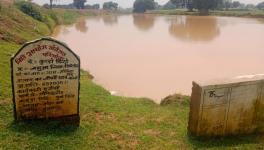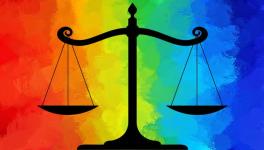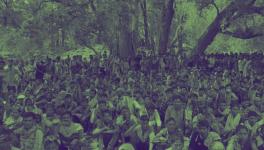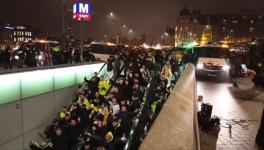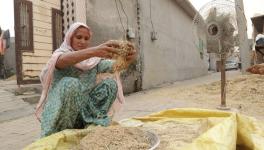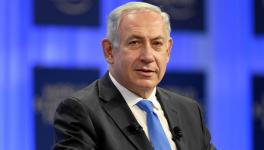Under the Cover of the Pandemic, States Cracked Down Even Harder
[Peoples Dispatch brings you a series of articles and videos on 2020, a momentous year that saw humanity face unprecedented challenges. The beacon of hope remained the historic resistance mounted by people’s movements, and the care and solidarity they epitomized, proving yet again that our collective struggles alone can dismantle and end oppression. You can read the full series here]
2020 will likely go down in history as the year of the great lockdown. As the coronavirus spread like wildfire, millions were forced into their homes to curb the transmission of the deadly virus. Millions more were forced to remain at their posts, in hospitals, sanitation plants, grocery stores, the fields, care facilities and other ‘front line’ work posts.
With the adverse situation, governments and political leaders made vague calls for national unity to overcome the pandemic. Some governments were forced to make mild concessions, enacting rent moratoriums, relaxation of debt payments, and sometimes even bolstering previously gutted national health systems. However, this honeymoon of national unity and togetherness did not last long in most countries.
In many countries, especially those already with bad track records for suppression of dissent and criminalization of protest, the pandemic and the lockdowns served as justifications for governments to tighten their grip on society and unleash new, unprecedented campaigns of repression against historic “enemies of the state” and against all those taking the streets to protest.
The lockdown conditions provided the perfect cover for selective arrests and dulled the possibility of a mass campaign on the streets rejecting such targeted acts of criminalization. In countries such as India, Thailand, Colombia, Palestine, the US and others, we saw a sharp uptick in state repression of those who have dared to fight for a better future.
India
The Bharatiya Janata Party-led government in India continued its repression of political opposition and minorities and used the COVID-19 related lockdown to advance its anti-people agenda. In the beginning of the year, it stood by during a vicious campaign against those protesting the citizenship laws. This campaign ultimately led to large-scale violence against minorities in the capital Delhi. The government used the violence and COVID-19 outbreak to not only disrupt the months-long protests but also, under the watch of Home minister Amit Shah, the Delhi police targeted a large number of leaders of the anti-citizenship law campaign and arrested them, blaming them for the violence. Most of them were charged with the draconian anti-terrorism law, the Unlawful Activities Prevention Act (UAPA). The BJP-ruled state of Uttar Pradesh took a similar approach against the protesters.
Student leaders such as Natasha Narwal, Devangana Kalita, Sharjeel Imam and political activists including Umer Khalid, Ishrat Jahan, Khalid Saifi, Safoora Zarger and Kafeel Khan among several others were arrested for their alleged role in the Delhi riots. Most of them are still in jails without being formally charged for months now.
The Modi government used COVID-19 related lockdowns to arrest human rights activist and journalist Gautam Navlakha and scholar Anand Teltumbde in April under the same draconian UAPA for their alleged involvement in Bhima Koregaon case. The government arrested 83 years old human rights activist Stan Swamy in the same case in October 2020. Similarly the cases of 79-year-old Varavara Rao, in prison since 2018, and G.N. Saibaba, who is 90% disabled and has been in prison since 2017, have raised great concern. In all these cases, the government and courts have refused to consider the concerns raised by family members about their advanced age and vulnerability to COVID-19 infection in prison.
In several other cases, the courts accepted arguments by the police and the government, and ignored procedures and established conventions to deny bail. The police and government used media, both social and conventional, to push campaigns terming arrested activists and journalists critical to its policies as “urban naxals” or “anti-nationals.” They have similarly vilified minorities and justified the blatant misuse of state machinery and violation of people’s human rights.
Palestine
The Palestinian struggle for the right to self-determination faced increased repression in the year 2020 with the Netanyahu-led Zionist regime. His administration used its proximity to fellow imperialist powers, to threaten formal annexation of around one third of the occupied West Bank in the name of Trump’s so-called “deal of the century” and to attempt to isolate the Palestinian people within the larger Arab world through the so-called “normalization deals” with some of the Arab countries.
The year saw a number of killings of the innocent Palestinians. The murder of 32-year-old Iyad Halaq, 27-year-old Ahmed Erekat, 29-year-old Mustafa Abu Yaacoub and 13-year-old Ali Ayman Abu Aliya were condemned internationally. UN human rights experts condemned the killing of Abu Aliya and called for an independent investigation and expressed that they were “deeply troubled by the overall lack of accountability for the killings of Palestinian children in recent years.” Furthermore they highlighted that Abu Aliya was the sixth Palestinian child living in the West Bank to be killed by Israeli security forces with live ammunition in 2020. They reported that between November 1, 2019 and October 31, 2020, 1,048 Palestinian children were injured by Israeli security forces in the Occupied Palestinian Territories.
The Israeli regime used COVID-19 pandemic to arrest and illegally detain several Palestinian activists, including many students and freedom fighters, despite concerns of increased vulnerability of prisons. It carried out demolitions of Palestinian houses and used the state authority and its occupying forces to continue stealing Palestinian land and advanced projects to build illegal settlements and outposts by displacing the rightful owners by force.
Colombia
The human rights record of the far-right government of Iván Duque is one of the worst in the region. Under the shadow of the lockdown, his government tightened its grip in its attack on social movements and, at the bare minimum, turned a blind eye to what movements have called a genocide of social leaders, human rights defenders, and ex-combatants/signatories of the 2016 peace agreements.
In 2020, according to reports from the Institute of Development and Peace Studies (INDEPAZ), 310 social leaders and human rights defenders were assassinated. 90 massacres were committed and 65 signatories of the peace agreements, demobilized combatants from the Revolutionary Armed Forces of Colombia (FARC), were killed.
At the same time, the repression and criminalization of social movements has increased significantly. This ranges from surveillance and harassment of social leaders by government agents and members of the public force, to conspiratorial frame-ups which have put dozens of social leaders behind bars. A recent example was on December 15 and 16, when three historic peasant leaders Teófilo Acuña, Adelso Gallo and Robert Daza were arrested and accused by the Attorney General of being part of an armed guerrilla group. They were released following a tireless campaign by movements to show that their work as peasant leaders and defenders of the land and human rights is not a crime.
The mass protests that took place in the Colombian capital, Bogotá in early September against the police killing of Javier Ordóñez were also met with brutal repression by security forces. The violent repression by police resulted in the killing of 13 people (10 in Bogotá, 3 in Soacha), more than 65 gravely injured by firearms, with more than 400 were injured overall, and hundreds arbitrarily detained.
Thailand
In Thailand, the year began with an attack on democracy and popular will with a mass shooting by a soldier that killed 30 and injured dozens and the dissolution of a major opposition party by the constitutional court, at the behest of the military-supported government of Prayut Chan-o-cha.
Over the next few months suppression of democratic avenues brewed until protests broke out in mid-July in the capital, Bangkok, and elsewhere across the country. The protests included a cross section of people from students groups to trade unions converging on a common demand to end the military’s control over civilian governments, an end to the nation’s lese-majeste laws, and an end to hounding of activists and journalists. Ironically, the government did exactly the opposite of what the protesters have been demanding. From declaring an abortive declaration of emergency, slapping charges of “insulting the monarchy” on dozens of protesters and even pursuing cases against media outlets reporting on the protests. Nevertheless, the movement continues unabated and will continue to grow stronger next year.
Philippines
In the Philippines, repression continued under president Rodrigo Duterte. Even though the year began with a truce between the government and the communist insurgents, it slowly deteriorated as the year rolled in. Attacks on media stood out particularly, with the conviction against veteran journalist Maria Resa and her colleague from the Rappler, the closure of a national broadcaster ABS-CBN, and the murder of a regional radio journalist Virgilio Maganes. Filipinos also had to deal with a particularly repressive government during the COVID-19 pandemic, which pushed a new anti-terror law. Political assassinations also continued this year, despite calls for protection from civil society groups against proven threat to life. But efforts from activists and grassroots leaders paid way after a recent report by the chief prosecutor of the International Criminal Court found the government guilty of possible crimes against humanity in its anti-drugs campaign.
Poland
The conservative Law and Justice(PiS) party led government in Poland relentlessly pursued their regressive, misogynistic policies and continued the persecution of communists in 2020. In order to reinforce their scheming for absolute power, the PiS regime called for the presidential elections amidst the peak of the COVID-19 pandemic in May. Widespread popular outrage forced the government to postpone the elections and when the elections happened on July 12, PiS-backed Andrzej Duda managed to win only with 2% majority over than liberal opposition candidate.
The PiS government’s decision to quit the European treaty on violence against women and domestic violence – popularly known as the Istanbul Convention – drew widespread protests from women’s groups, the left and the international community. In October, the Polish constitutional court ruled that abortions in the case of foetal defects are unconstitutional. Women’s groups, the Polish left and other progressive sections denounced the judgement as a war on women and started massive protests across the country. Throughout the year, women’s groups and progressives in Poland fought tirelessly against the tyranny of PiS, braving police crackdowns and harassment from far-right miscreants.
United States
2020 saw one of the largest sustained uprisings in the history of the United States. Millions took to the streets in cities and towns across the country, both large and small, to protest against the racist killing of George Floyd on May 25 in Minneapolis and against the racist system that continues to perpetuate these acts of violence while ensuring impunity for the perpetrators. The central slogan of the protests #BlackLivesMatters was echoed across the world, with protests in Australia, Brazil, France and the United Kingdom also demanding justice for victims of police violence and structural change to address racism.
However, this great uprising was also met with harsh repression. Images circulated across social media throughout the months of the uprising of local police officers and federal officers, sent at the request of local officials or by the federal government, using violence and force to attack protesters. Officers used tear gas, baton attacks, and rubber bullets against the protests causing hundreds of injuries to protesters and members of the press.
In several cities such as Philadelphia, civil rights groups filed lawsuits against city administrations for disproportionate use of force and racialized and militarized policing.
The repression was not limited to violent police attacks, according to reports, over 300 demonstrators were charged with federal crimes, during the course of the uprising. Civil rights advocates have pointed out that many of these charges are either exaggerated claims by law enforcement agencies or completely trumped up. On September 18, three organizers from the Party for Socialism and Liberation (PSL) in Denver, Colorado, Lillian House, Eliza Lucero and Joel Northam, were arrested on charges ranging from felony charges of kidnapping and rioting to misdemeanors like disturbing the peace. The activists were on the forefront of the mass anti-racist movement and in Denver organized fiercely to demand justice in the case of 23-year-old Elijah McClain who was murdered by officers from the Aurora Police Department (city next to Denver) on August 24, 2019. They were released on bond after spending a week in prison but the District Attorney has yet to drop the charges.
This year was also key in the struggle to free one of the key political prisoners, Julian Assange. The trial portion for Julian Assange’s extradition hearings took place in the month of September, at the Central Criminal Court or the Old Bailey in London. The case which deals with the fundamental question of press freedom, began with censorship, as the judge presiding over the case, Vanessa Baraitser, excluded over 40 applicants for remote access to the trial. Throughout the four weeks of trial, testimonies were presented from nearly three dozen expert witnesses, covering a range of aspects of the case, from Assange’s mental health to the political nature of the charges he will be facing in the US to the possibility of torture and maltreatment he is likely to face if extradited. Judge Vanessa Baraitser is set to deliver the verdict on January 4, 2021. Since the conclusion of the trial, Assange remained in the Belmarsh prison as he was denied bail.
A large number of global leaders and personalities, as well as social movements, have manifested their support to Assange and rejected his persecution and extradition including former Brazilian presidents Luiz Inácio Lula da Silva, Dilma Rousseff, former Ecuadorian president Rafael Correa, Roger Waters, Jeremy Corbyn, Noam Chomsky, Argentine president Alberto Fernández, and many others.
With contributions from Abdul Rahman, Anish R.M., Muhammad Shabeer and Zoe PC.
Get the latest reports & analysis with people's perspective on Protests, movements & deep analytical videos, discussions of the current affairs in your Telegram app. Subscribe to NewsClick's Telegram channel & get Real-Time updates on stories, as they get published on our website.









